Summary
It is sometimes said that “Israel is famously low on natural resources” and that the country’s economic stability is largely due to its advanced high-tech sector, link. But in recent years things have changed with the discovery of very significant oil and gas reserves. The off-shore Levant gas field could eventually provide Israel with 50 to 200 years of gas at current levels of use, encouraging the construction of a gas pipeline to Europe. When it comes to oil, Israel has one of the world’s largest deposits of shale oil, with a potential of some 250 billion barrels in the Shfela basin. Israel’s mining sector extracts minerals from the Dead Sea (for export via Israel’s southern port of Eilat) and extracts millions of tons of aggregate from Judea & Samaria for the building industry.
Israel’s Natural Resources: Discoveries of Gas, Oil and Minerals
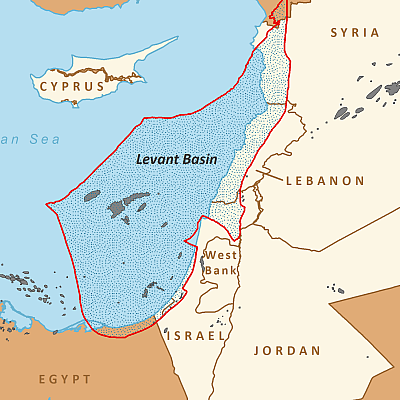
Fig.1: Known oil and gas fields in the Levant Basin. Red = Levant Basin. Grey = oil and gas fields. Image: US Energy Information Administration, Wikimedia Commons
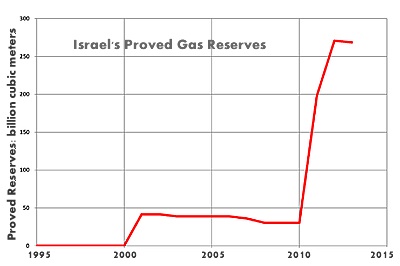
Fig.2: Israel’s proved gas reserves
Gas Reserves
In 2010 Israel discovered at least 16 trillion cubic feet (Tcf) of natural gas in the Eastern Mediterranean, link, link. The reserves are in the Levant Basin some 130 km west of Haifa. Two offshore gas fields, the Leviathan and the Tamar (the large grey areas in Fig.1), hold the vast majority of Israel’s gas reserves, with more than enough to feed domestic demand, bring down Israel’s electricity costs and have enough gas for export. The most significant find is the Leviathan field, and in 2014 the Israeli government approved plans to supply the Palestinian Authority with natural gas from the Leviathan field once production commences, link.
As of 2014, Israel’s proved reserves of natural gas were 10.1 trillion cubic feet (Tcf), link, with the Leviathan having an estimated 22 Tcf (622 billion cubic meters) of reserves, link.
Looking to the future: Recent discoveries show that Israel is potentially rich in natural resources. The Leviathan could provide $230 billion in gross domestic product to Israel over the life of its exports and more than 20 years of domestic supply, link. It is estimated that Israel may discover 50-200 Tcf of natural gas (and possibly 500-3000 million barrels of oil i.e. up to 3 billion barrels). Some claim the Levant Basin gas field could eventually provide Israel with 50 to 200 years of gas at current levels of use, link. The US Geological Survey (USGS) says these are some of the biggest discoveries worldwide:
“The Levant Basin Province is comparable to some of the other large provinces around the world … its gas resources are bigger than anything we have assessed in the United States” [USGS]
New Gas Pipeline: Israel to Europe
December 2018: Cyprus, Greece, Israel and Italy signed a memorandum of understanding to build the world’s longest underwater natural gas pipeline to supply Europe. It will run from Israel’s off-shore gas fields via Cyprus and Greece to Italy, link. There will be high infrastructure costs (around US $6.2 billion) and construction would not begin for several years. It could go online in 2025, link. The project has full support of the EU and aims to produce gas at a price to rival that from Russia. Clearly, this is not good news for Russia, and may be a factor in the coming Russian-Iranian invasion of Israel.
Political Disputes
But ever since the Leviathan discovery, Israel has faced serious regulatory and political challenges, link. The Levant Basin is shared by Gaza, Lebanon, Cyprus and the Turkey-dominated Turkish Republic of Northern Cyprus, leading to maritime disputes. Turkey and Lebanon have challenged Israel’s right to the reserves, and the Israel/Lebanon maritime border in the Levant Basin is disputed (see map) with Lebanon claiming Israel is violating international law, link. Even so, it is claimed about 45% of the Levant Basin falls within Israel’s land and economic waters, link.
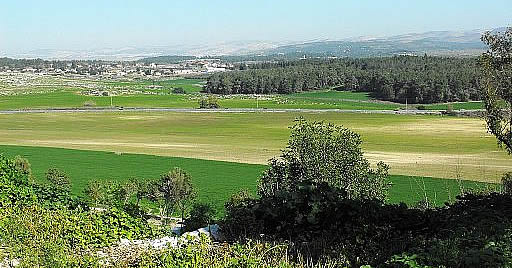
Shfela lowlands, Israel. The Shfela Basin has the potential of some 250 billion barrels of shale oil. Image: Ilana Shkolnik CC BY 2.5, via Wikimedia Commons
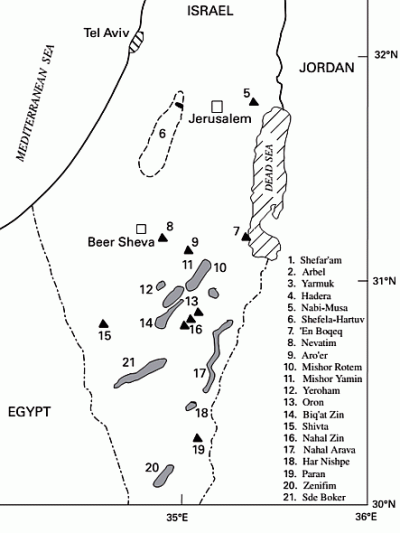
Fig.3: Israel’s shale oil deposits.
USGS Wikimedia Commons
Oil Reserves
As of 2014, Israel’s estimated proved reserves of oil were 11.5 million barrels, link. Others claim an estimated 620-billion cubic meter reservoir, link.
Shale Oil: In 2009 an Israeli geologist discovered oil embedded in rock in the ground southwest of Jerusalem. “There’s lots of it — and it could change the Middle East forever” [TIME]
In fact, it turned out that Israel has one of the world’s largest deposits of shale oil, with a potential of some 250 billion barrels in the Shfela basin, link, link. This represents the world’s third-largest quantity of oil shale behind the US and China.
The basin spans Israel and Jordan and shale deposits have been found to the south of Jerusalem, and outside of the West Bank region, see map. Although expensive to extract, Israel is now pioneering shale oil technology. “Tried-and-tested oilfield technologies will be the key to delivering a new era of onshore oil in Israel” [Harold Vinegar, former Shell Oil Company Chief Scientist]. But, as for many shale oil projects, there is opposition on environmental grounds, link.
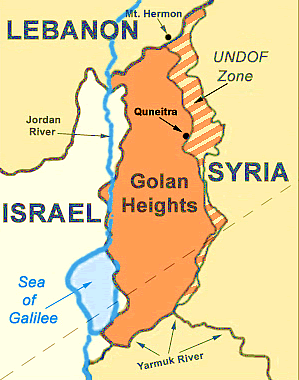
Israel finds oil in the Southern Golan Heights. Image: ProCon.org
Oil in the Golan Heights: Recent drilling has found thick oil strata in the Southern Golan Heights north-east of the Sea of Galilee, link. Afek, an Israeli subsidiary of Genie Energy (a US oil company) say the oil strata thickness is ten times the normal world strata thickness, implying a potential production of billions of barrels. This could easily provide all Israel’s oil needs, link, link. Compared to gas finds, which are well off shore, the oil find is relatively close.
But this area is disputed: Israel claims the oil and ignores claims that it legally belongs to Syria, link. Certainly, this area is just outside the 1922 League of Nations sub-division of Palestine, which identified a Jewish homeland and which still legally stands under Article 80 of the UN Charter, see map. Israel only gained the Golan Heights in response to unprovoked Arab attack in June 1967. The combined forces of Egypt, Jordan, Syria, Lebanon (and later Iraq) aimed to ‘wipe Israel off the map’, but failed. Will this dispute over huge oil deposits provoke the prophesied Gog-Magog invasion of Israel from the north? The Golan Heights or mountains could well be the battle field (Ezek 39.2).
Israel’s natural resources: Dead Sea Minerals
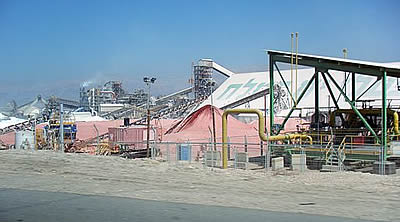
Dead Sea Works Plant
Cole Goldberg [CC BY-SA 3.0], Wikimedia Commons
Following thousands of years of evaporation, the Dead Sea now contains some 45,000 million tons of salts rich in minerals, link. This makes the Dead Sea the largest concentration of minerals in Israel. From a health point of view, minerals extracted from the water (such as calcium, magnesium and potassium) are said to improve the metabolism, stimulate circulation and aid in the natural repair of body cells. Some minerals are known to have unique qualities, giving a feeling of relaxation, nourishing the skin, activating the blood systems, healing rheumatic diseases and metabolic disorders. Even Dead Sea mud is believed to have benefits for deep cleansing and stimulation of the skin. Not surprisingly, the Dead Sea area has become a major center for health research and treatment, link, and thousands of people from all over the world come every year to the Dead Sea for healing, recovery, spa, and cosmetic treatment.
The mining sector of Israel extracts magnesium, bromides, phosphates, potassium, calcium and chlorides of sodium, all of which are important for the manufacture of fertilizers and explosives, link. Much of this is extracted from the Dead Sea and exported via Israel’s southern port of Eilat. These exports are significant worldwide. In 2010 Israel’s share of the world’s output of monopotassium phosphate was over 40%, link, and in 2013 her share of the world’s bromine production amounted to 32%, link.
Israel’s natural resources: Mining and Quarrying
Israel’s mining and quarrying sector supplies about 50 million tons of raw material per year for building and road construction, link. The sector supplies sand, gravel, chalk, gypsum, limestone and stone for cladding and flooring. Road construction requires gravel as a sub-grade and filler material, as well as quarry sand and basalt gravel for asphalt mixtures. Some 7-8 million tons of aggregate come from Judea & Samaria. The highlands of Israel and the West Bank are primarily underlain by forms of limestone, and this is quarried for building purposes. Many of the buildings in Jerusalem use forms of white, pink, yellow and tawny limestone (known collectively as Jerusalem stone).
Gold and Diamonds: Gold has been found in Israel since biblical times, and a survey around 1950 claimed that King Solomon’s mines had been discovered in Southern Israel, link. Today, Israel’s natural resources of gold and silver are being estimated by the Dynasty Goldfield Project and the Jerusalem Gold Project, link.
Although Israel does not produce rough diamonds, the country is one of the world’s leading diamond cutting, polishing and trading centers. Companies specialize in large, high-value gemstones, link.
Israel’s Natural Resources: Water
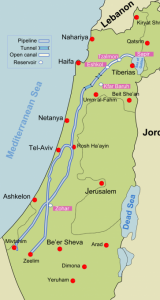
Israel’s National Water Carrier. Image: NielsF CC BY-SA 3.0, Wikimedia, Enlarge
Rainfall Statistics: Israel is a dry land with no large replenishing rivers (like the Nile for Egypt). So, until recently, Israel has been totally dependent upon natural rainfall. In the Golan Heights region (which supplies the Jordan and Lake Galilee) typical annual rainfall is 600-900 mm dropping to around 500 mm in Jerusalem and Tel Aviv. In the south it drops to only 200 mm at Beer Sheva and a mere 20 mm at Elat, link. In contrast, parts of western and northern England average 1000-1500 mm per year. So, overall, Israel’s total annual renewable natural sources of fresh water are well below the UN definition of water poverty (which is obviously population dependent). According to the UN, when annual water supplies drop below 1,000 cubic meters per person, the population faces water scarcity, and below 500 cubic meters “absolute scarcity”, link. In Israel the renewable fresh water/capita was 327 cubic meters in 1962, falling to just 91 in 2014, link. The corresponding figures for the UK are 2,700 and 2,200. Clearly, Israel’s renewable fresh water is at a premium and existing resources are well over used.
National Water Carrier: As the statistics show, Israel’s surface water is concentrated mainly in the north and east of the country – notably Lake Galilee – which is fed primarily from the Jordan River system. In fact, 80% of Israel’s natural water is in the north and so the National Water Carrier system conveys water from Lake Galilee southwards. The other two main sources of water are the Coastal Aquifer (the coastal plain of the Mediterranean Sea) and the Mountain Aquifer (under the central north-south Carmel mountain range), both of which are accessed by pumping. It is claimed that these aquifers lie under Palestinian territory (Gaza and the West Bank respectively), link, although this can be disputed on legal grounds.
Desalination: Today, to boost natural rainfall, Israel makes extensive use of desalination plants, reuse of treated sewage for agriculture, computerized early-warning systems for leaks, and computerized drip irrigation and micro-sprinklers. As of 2016, Israel had five desalination plants, the largest (Sorek) producing over 600 million cubic meters of water/year, link. This plant alone provides enough drinking water to supply 1.5 million people!
Israel’s Water Generation
From the Air

Air is a ‘natural resource’ and so it only needs clever technology to turn it into a water resource. Watergen, an Israel-based company uses humidity in the air to create clean and fresh drinking water. The heart of the Watergen product line is the revolutionary GENius™ heat-exchange technology. Air is drawn into the Atmospheric Water Generator (AWG), where it is thoroughly cleaned, removing any dust and dirt and leaving only pure air in the system. The clean air is then directed through the heat exchange and cooling process, bringing it to its dew-point – the temperature at which condensation occurs – to create water.
Watergen’s Large Scale unit is an industrial scale AWG, designed for towns, villages, factories, off-grid settlements and communities. It can generate up to 5,000 liters of clean water each day. The first AWG system was installed in New Delhi, India in 2017.
From the Sea
The desalination method Israel uses in its largest plants is called reverse osmosis (RO), link. In reverse osmosis, saltwater is hurled at a plastic filter with holes big enough only for the water molecules to pass through. Since Na and Cl are too large to fit through the plastic membrane, the salt stays on one side and only pure water reaches the other. The method works because water molecules are much smaller than both Na and Cl atoms.
At Israel’s largest desalination plant two enormous pipes carry in water from the Mediterranean Sea. Once the water reaches the plant, which is called Sorek, it progresses through stacks of RO membranes. Not all of the water makes it through. If it did, you would end up with a hard block of salt stuck to one side of the membrane, which would be very difficult to clean or remove. Instead, some water stays behind with the salt. This leftover water is called brine. Another large pipe carries the brine from the plant back out to sea, where the salt quickly becomes dispersed. After the water has passed through the RO membranes it is fit to drink and used in Israeli homes.
God’s Provision of Natural Resources
When Israel’s natural resources of gas and oil are developed, they will bring Israel to energy independence, and will even enable Israel to be a net energy exporter. Prime Minister Benjamin Netanyahu has called the gas “a gift from nature” that could earn Israel $60 billion in tax and royalties.
A gift from ‘nature’? Some see these natural resources as part of God’s future blessing of Israel. Before Moses died, he blessed the tribes of Israel and some of these blessings involved blessing of the sea and the land. Joseph was to be blessed with ‘precious things from the deep lying beneath’ (Deut 34.13), Asher was to ‘dip his foot in oil’ (Deut 34.24) and Zebulun and Issachar were to find ‘hidden treasures in the sand’:
For they shall partake of the abundance of the seas and of the treasures hidden in the sand (Deut 33.19, emphasis added)
The tribe of Zebulun would live at the seashore and go out in ships to engage in trade and make a profit. Today, this trade could be gas and shale oil.
Rain: Egypt has the Nile and Iraq has the Euphrates but Israel has no large replenishing rivers like this. Apart from modern desalination plants, Israel (and the River Jordan) is largely dependent upon natural provision from the sky – rain. Israel is dependent on “the heavens” in a very real and practical way. It seems that God chose this dry land so that the people of Israel (His chosen people) had to look to Him for such provision. The apostle Paul acknowledged that God provided Old Testament Israel with “rain from heaven” for their crops (Acts 14.17). Similarly, when it comes to the future (Millennial Israel), the God of Israel promises literal showers of blessings from heaven so that abundant crops will grow:
I will cause showers to come down in their season; there shall be showers of blessing. Then the trees of the field shall yield their fruit, and the earth shall yield her increase (Ezek 34.26,27)







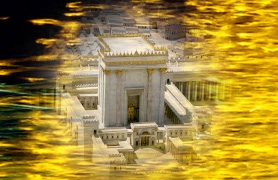





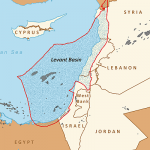













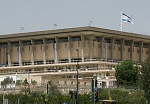



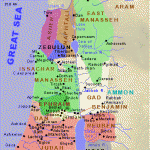


Amen. God is good. God will supply all our needs according to His rixhes in glory through Christ Jesus
The God of Israel is indeed great. But why does Israel still depend on US for survival?
At the end of the age ALL nations will be against Israel, which must include the US (Zechariah 14:2)
God will not abandon Israel, ever! When the Lord says he will do something he will. That is a guarantee! Trust in the Lord and have faith.
Praise the Lord
Can someone deny this fact that there is no God like the God of israel? Who keep his promise to thousand of his generation and to them that fear him( gift from nature). And even though not all jews believe him as he came to his own, which recieve him not yet for the sake of his promise to their fathers he still fulfills he’s intended promise to them. How much more those who have recieved him and have become his sons? To them also has he giving the power to become the sons of the promise. Not to them that are of the circumsion (flesh)alone, but to us also who are born according to his life and deeds which is by the spirit of him who has bless us all in himself the express image(jesus) of God. To him be glory now and forever more.Amen
Amazing-ly helpful
We would like to know if it would be possible to use your sketch of Ezekiel’s Millennial map of Israel in our forthcoming book Sovereign Lion? We would certainly cite your organization.
Many thanks, and God bless.
Dr. Jerry Parks
We assume you refer to Fig.3 / Fig.4 on page https://www.factsaboutisrael.uk/future-borders-of-israel-in-prophecy/ Certainly, please use it.
God bless
Geoff
God promise to you is you be the head and not the the tail, He is faithful to His word and will fulfill it.